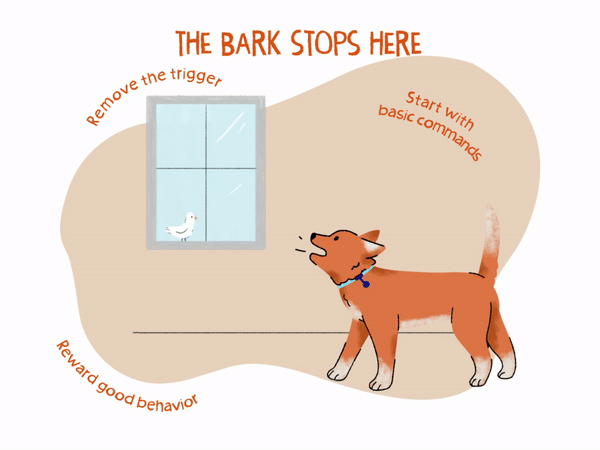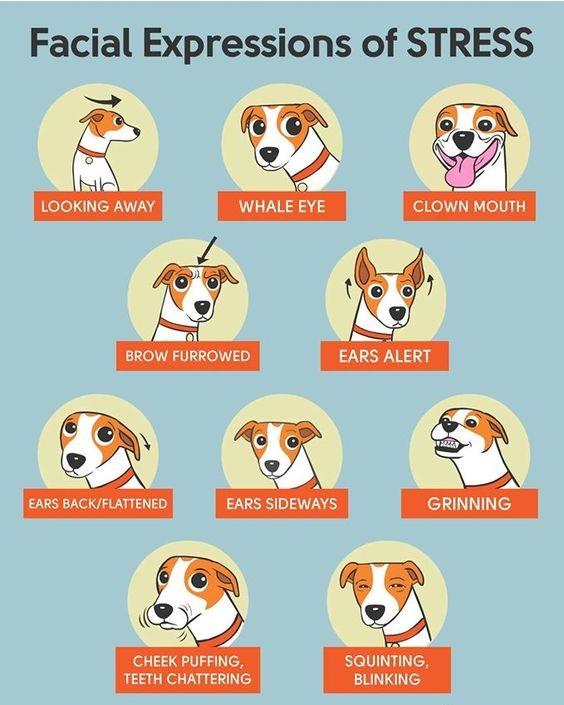Introduction

The incessant barking of dogs can be a frustrating issue for both pet owners and their neighbors. Understanding why dogs bark excessively and how to address this behavior is crucial in ensuring the wellbeing of our furry friends. Excessive barking can be an indicator of underlying emotional or physical distress, which requires our attention. This article will delve into the common reasons behind excessive barking and provide effective strategies to manage and control it. By implementing these techniques, dog owners can create a peaceful environment for both themselves and their beloved pets.
The importance of understanding and addressing excessive barking in dogs
:strip_icc()/puppy-barking-2804577-f7f6bffd80fa4edca1bd247ba52fc0a6.jpg)
Understanding and addressing excessive barking in dogs is essential for both the well-being of the dog and the sanity of their owners. Excessive barking can be a sign of underlying issues such as separation anxiety, fear, aggression, or health problems. It is important to recognize that dogs use barking as a way to communicate, so excessive barking may indicate that something is wrong or that their needs are not being met. By understanding the reasons behind excessive barking and implementing effective strategies, such as training techniques and environmental enrichment, owners can help their dogs to reduce their barking and improve their overall behavior.
Common reasons why dogs bark excessively

Excessive barking is a common behavior problem in dogs, and there can be several reasons behind it. One of the main causes is separation anxiety and loneliness. Dogs are social animals and can feel distressed when left alone for long periods. Another reason could be fear, aggression, or territoriality. Dogs may bark excessively when they perceive threats or when they want to protect their territory. Understanding the underlying reasons for excessive barking is essential in effectively addressing and resolving this issue.
Understanding Normal Barking Behavior
:strip_icc()/puppy-barking-2804577-f7f6bffd80fa4edca1bd247ba52fc0a6.jpg)
Understanding normal barking behavior is crucial for dog owners to differentiate between excessive and appropriate barking. Dogs use barking as a form of communication, and different types of barks convey different messages. For instance, a high-pitched bark might indicate excitement or playfulness, while a deep, repetitive bark could signal a warning or potential danger. By understanding the various meanings behind their dog's barks, pet owners can better respond to their needs and ensure they are providing appropriate care and attention.
Types of barks and their meanings

There are various types of barks that dogs use to communicate their different needs and emotions. Understanding these types of barks can help us interpret what our furry friends are trying to express. For example, a short and sharp bark often indicates alertness or a warning. On the other hand, a continuous and high-pitched bark may signal excitement or attention-seeking behavior. Additionally, a low and growling bark can be a sign of aggression or territoriality. By paying attention to the specific sounds and context of the barks, pet owners can better understand their dogs' communication and respond accordingly.
How dogs communicate through barking

Dogs use barking as a way to communicate with humans and other animals. Each bark carries a specific meaning or message. For example, a high-pitched, rapid bark might indicate excitement or playfulness, while a deep, continuous bark could signal aggression or warning. Additionally, the volume, duration, and frequency of barking can convey different emotions or needs. It's important for dog owners to pay attention to these cues and understand the context in which the barking is occurring to effectively address their dog's communication needs.
Why Dogs Bark Excessively

Excessive barking in dogs can often be a sign of underlying emotional or behavioral issues. One common reason for excessive barking is separation anxiety and loneliness. Dogs may bark excessively when they are left alone for long periods of time, feeling anxious and seeking attention. Fear, aggression, and territoriality are also factors that contribute to excessive barking. Dogs may bark excessively as a response to perceived threats or to establish their dominance. Understanding these reasons behind excessive barking is crucial in order to address the root cause and find effective solutions.
Separation anxiety and loneliness

Separation anxiety is a common cause of excessive barking in dogs. When a dog becomes overly attached to their owner and experiences distress when left alone, they may express their anxiety through incessant barking. This can occur due to a lack of socialization or past traumatic experiences.
Loneliness can also contribute to excessive barking in dogs. Dogs are social animals and thrive on companionship. When left alone for long periods without any stimulation or interaction, they may resort to barking as a way to seek attention and alleviate their feelings of isolation.
Both separation anxiety and loneliness can be addressed through training and environmental enrichment. Providing the dog with engaging activities, creating a comfortable space, and gradually acclimating them to being alone can help reduce excessive barking stemming from these factors.
Fear, aggression, and territoriality

Fear, aggression, and territoriality are common factors that can contribute to excessive barking in dogs. Dogs may bark excessively out of fear when they encounter new people or unfamiliar situations. Aggression can also lead to excessive barking, especially when dogs feel threatened or perceive a potential danger. Additionally, dogs have a natural instinct to protect their territory, which can result in continuous barking when they perceive a threat to their space. Understanding and addressing these underlying emotions is crucial in effectively managing and reducing excessive barking.
Addressing Excessive Barking Through Training

Addressing excessive barking through training is an essential step in curbing this behavior in dogs. Positive reinforcement training techniques are highly effective in teaching dogs to control their barking. By rewarding them for calm and quiet behavior, dogs learn to associate silence with positive outcomes. Additionally, teaching the "quiet" command can be beneficial in giving dogs a cue to stop barking on command. Consistency and patience are key when implementing these training methods, ensuring that the dog understands what is expected of them and reinforcing the desired behavior.
Positive reinforcement training techniques

Positive reinforcement training techniques involve rewarding dogs for desired behaviors, rather than punishing or scolding them for unwanted behavior. This approach focuses on providing incentives, such as treats or praise, when the dog exhibits appropriate behavior. By using positive reinforcement, dogs learn to associate the desired behavior with a positive outcome, which encourages them to repeat that behavior in the future. This method is highly effective in reducing excessive barking because it teaches dogs alternate ways to communicate their needs and redirects their attention away from barking.
Teaching the quiet command

Teaching the quiet command is an effective way to address excessive barking in dogs. This command teaches the dog to be silent on cue, giving them an alternative behavior to replace their barking.
To teach the quiet command, start by waiting for a moment of silence during their barking episode. Then, calmly say "quiet" and wait for a few seconds of silence before rewarding your dog with praise and treats. Repeat this process consistently, gradually increasing the time they need to be quiet before receiving the reward. With patience and consistency, your dog will learn to associate the "quiet" command with silence and eventually bark less when prompted.
Managing Barking Through Environmental Enrichment

Environmental enrichment plays a crucial role in managing excessive barking in dogs. By providing mental and physical stimulation, owners can help redirect their dog's energy and prevent boredom-related barking. This can be achieved through various activities such as puzzle toys, interactive games, and regular exercise. Additionally, creating a comfortable and secure environment for the dog can help reduce anxiety and stress levels, leading to fewer instances of excessive barking. By incorporating these environmental enrichments into the dog's daily routine, owners can effectively manage and control their dog's barking behavior.
Providing mental and physical stimulation

Providing mental and physical stimulation is crucial in preventing excessive barking in dogs. Dogs are intelligent and active animals that need both mental and physical exercise to stay balanced and content. Mental stimulation can be achieved through interactive toys, puzzle games, and training sessions that challenge their minds. Physical exercise includes daily walks, playtime, and engaging in activities such as fetch or agility training. By meeting their physical and mental needs, dogs are less likely to become bored or frustrated, reducing the chances of them barking excessively.
Creating a comfortable and secure environment

Creating a comfortable and secure environment for your dog is crucial in addressing excessive barking. Dogs may bark excessively if they feel stressed, anxious, or unsafe in their surroundings. To alleviate these feelings, provide your dog with a cozy and calming space indoors, such as a comfortable bed or crate. Make sure their outdoor area is secure and free from any potential threats that may trigger barking. Ensuring a peaceful environment will help your dog feel safe and reduce their urge to bark excessively.
Utilizing Bark Control Devices

When it comes to addressing excessive barking in dogs, utilizing bark control devices can be an effective solution. There are various types of bark control devices available in the market. One such device is the citronella collar, which emits a harmless citronella spray whenever the dog barks excessively. Another option is the ultrasonic device that releases a high-frequency sound that is only audible to dogs, deterring them from barking continuously. It is important to choose a bark control device that is suitable for your dog's size and temperament. However, it's essential to note that while these devices can aid in curbing excessive barking, they should be used as part of a comprehensive training plan and not as the sole solution.
Types of bark control devices

There are various types of bark control devices available in the market today. One common type is the ultrasonic device, which emits a high-pitched sound that is unpleasant to dogs but inaudible to human ears. Another type is the citronella collar, which releases a burst of citronella scent when triggered by barking. Some devices use vibration or static correction to deter barking. It is important to choose a bark control device that is suitable for your dog's size and temperament, and to follow the instructions provided by the manufacturer for safe and effective use.
Effectiveness and considerations

When it comes to utilizing bark control devices, it's essential to consider their effectiveness and other pertinent factors. Various types of devices can help in curbing excessive barking, such as ultrasonic devices, citronella collars, and vibration collars. However, the effectiveness may vary depending on the individual dog and the underlying cause of their barking. It's crucial to carefully select a device that is appropriate for your dog's size, temperament, and specific barking behavior. Additionally, it's important to ensure that the device is used correctly and consistently to achieve the desired results without causing any harm or distress to your furry friend.
Seeking Professional Help

When dealing with excessive dog barking that seems difficult to control, seeking professional help may be the best course of action. Professional dog trainers or behaviorists have the expertise and experience to assess the underlying causes of excessive barking and develop effective behavior modification techniques. They can provide guidance on training methods, implement specific exercises tailored to your dog's needs, and offer valuable advice on managing barking triggers. Consulting a professional ensures that you are receiving expert guidance and support to address the issue effectively.
When to consult a professional dog trainer or behaviorist

If you have tried various training techniques and still struggle to control your dog's excessive barking, it may be time to seek professional help. Dog trainers and behaviorists are experts in understanding canine behavior and can provide tailored solutions for your specific situation. Consider consulting a professional if your dog's barking is causing distress or problems within your household, if the barking is accompanied by aggression or anxiety, or if you are unsure about how to address the issue effectively. Professional guidance can greatly improve the chances of successfully addressing excessive barking and restoring harmony in your home.
Behavior modification techniques

Behavior modification techniques are strategies used to change and improve a dog's behavior. These techniques involve identifying the root cause of excessive barking and implementing targeted interventions to address it. Some common behavior modification techniques include desensitization and counter-conditioning, which involve gradually exposing the dog to situations that trigger barking and teaching them new, more appropriate behaviors. Another technique is reward-based training, where desired behaviors are reinforced with rewards such as treats or praise. Behavior modification techniques require consistency and patience to see long-term results in reducing excessive barking.
Dealing with Medical Issues

Sometimes, excessive barking in dogs may not be solely behavioral. It is crucial to consider the possibility of underlying medical issues that could be causing or contributing to the problem. Certain health conditions can trigger incessant barking, such as pain, discomfort, or cognitive disorders. To address this, it is advisable to consult a veterinarian for a thorough evaluation of your dog's health. By ruling out any medical issues and addressing them accordingly, you can effectively manage and reduce excessive barking in your furry friend.
Possible underlying health conditions that can cause excessive barking

Excessive barking in dogs can sometimes be attributed to underlying health conditions. These conditions can include pain or discomfort, such as from dental issues, injury, or arthritis. Hormonal imbalances, such as thyroid problems or Cushing's disease, can also contribute to excessive barking. Additionally, cognitive decline and certain neurological disorders may cause dogs to bark excessively. It is important for pet owners to be aware of these potential health issues and consult with a veterinarian for proper evaluation and treatment if they suspect their dog's excessive barking stems from an underlying medical condition.
Consulting a veterinarian for evaluation

If your dog is exhibiting excessive barking, it's essential to consult a veterinarian for evaluation. A veterinarian will be able to determine if there are any underlying health conditions that may be causing or contributing to the excessive barking. They will conduct a thorough examination and potentially run diagnostic tests to rule out any medical issues. By consulting a veterinarian, you can ensure that your furry friend receives the appropriate treatment and address the problem effectively. Remember, a healthy dog is more likely to have normal barking behavior.
Conclusion

In conclusion, understanding and addressing excessive barking in dogs is crucial for maintaining a harmonious living environment. By recognizing and addressing the underlying reasons for excessive barking, such as separation anxiety, fear, or territoriality, dog owners can effectively train their pets to control their barking behavior. Utilizing positive reinforcement training techniques, providing environmental enrichment, and considering the use of bark control devices can also help manage excessive barking. In cases where professional help or medical evaluation is needed, consulting a dog trainer or veterinarian is essential. With patience and consistency, it is possible to stop excessive barking and create a peaceful atmosphere for both dogs and their owners.
The importance of patience and consistency

Patience and consistency are key when addressing excessive barking in dogs. It is important to remember that behavior change takes time and effort. Patience allows you to remain calm and understanding as you work with your dog, while consistency ensures that your dog receives clear and consistent messages. By consistently implementing training techniques and managing their environment, you can effectively teach your dog alternative behaviors and reduce excessive barking. Remember, patience and consistency are crucial for long-term success in modifying your dog's barking behavior.
Summary of effective strategies to stop excessive barking

Summary of effective strategies to stop excessive barking:
There are several strategies that can help address and reduce excessive barking in dogs. First and foremost, positive reinforcement training techniques can be highly effective. By rewarding desired behavior and redirecting attention away from barking, dogs can learn alternate ways to communicate and manage their emotions.
Teaching the "quiet" command is another useful tool, as it enables owners to control when their dogs should stop barking. Consistency and patience are key in this training process.
In addition to training, providing mental and physical stimulation through environmental enrichment is crucial. Engaging activities such as interactive toys, puzzle games, and regular exercise can help alleviate boredom and reduce excessive barking due to restlessness.
Creating a comfortable and secure environment is also important. Dogs may bark excessively if they feel anxious or unsafe in their surroundings. By providing a den-like space, utilizing crate training, or using calming aids such as pheromone diffusers, owners can help their dogs feel more secure and reduce the likelihood of excessive barking.
For more persistent cases or situations where other strategies have not been successful, bark control devices may be considered. These devices include citronella collars, ultrasonic deterrents, or vibration collars. However, it's important to carefully assess the suitability of these devices for each individual dog and consult with a professional if needed.
If all else fails, seeking professional help from a dog trainer or behaviorist is recommended. They can provide guidance on behavior modification techniques tailored specifically to the dog's needs and circumstances.
It's also essential to rule out any underlying medical issues that may be contributing to excessive barking. A thorough evaluation by a veterinarian should be conducted to address any potential health concerns.
In conclusion, addressing excessive barking requires a combination of training techniques, environmental enrichment, appropriate use of bark control devices (if necessary), seeking professional help when needed, and ensuring the dog's overall well-being. With patience, consistency, and a holistic approach, excessive barking can be effectively managed, promoting a harmonious relationship between dogs and their owners.




0 Comments